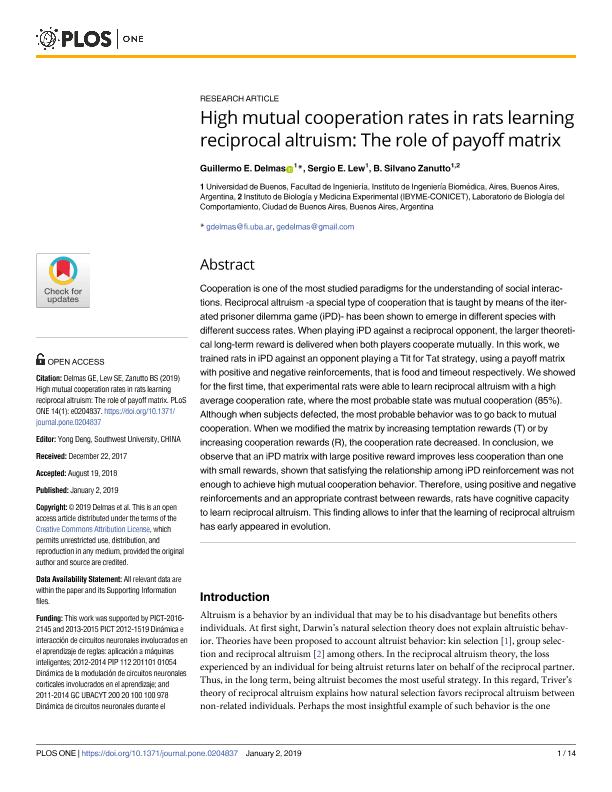Artículo
High mutual cooperation rates in rats learning reciprocal altruism: The role of payoff matrix
Fecha de publicación:
02/06/2019
Editorial:
Public Library of Science
Revista:
Plos One
ISSN:
1932-6203
Idioma:
Inglés
Tipo de recurso:
Artículo publicado
Clasificación temática:
Resumen
Cooperation is one of the most studied paradigms for the understanding of social interactions. Reciprocal altruism -a special type of cooperation that is taught by means of the iterated prisoner dilemma game (iPD)- has been shown to emerge in different species with different success rates. When playing iPD against a reciprocal opponent, the larger theoretical long-term reward is delivered when both players cooperate mutually. In this work, we trained rats in iPD against an opponent playing a Tit for Tat strategy, using a payoff matrix with positive and negative reinforcements, that is food and timeout respectively. We showed for the first time, that experimental rats were able to learn reciprocal altruism with a high average cooperation rate, where the most probable state was mutual cooperation (85%). Although when subjects defected, the most probable behavior was to go back to mutual cooperation. When we modified the matrix by increasing temptation rewards (T) or by increasing cooperation rewards (R), the cooperation rate decreased. In conclusion, we observe that an iPD matrix with large positive reward improves less cooperation than one with small rewards, shown that satisfying the relationship among iPD reinforcement was not enough to achieve high mutual cooperation behavior. Therefore, using positive and negative reinforcements and an appropriate contrast between rewards, rats have cognitive capacity to learn reciprocal altruism. This finding allows to infer that the learning of reciprocal altruism has early appeared in evolution.
Palabras clave:
paradigms
,
prisoner dilemma
,
cooperation rate
Archivos asociados
Licencia
Identificadores
Colecciones
Articulos(IBYME)
Articulos de INST.DE BIOLOGIA Y MEDICINA EXPERIMENTAL (I)
Articulos de INST.DE BIOLOGIA Y MEDICINA EXPERIMENTAL (I)
Citación
Delmas, Guillermo Ezequiel; Lew, Sergio Eduardo; Zanutto, Bonifacio Silvano; High mutual cooperation rates in rats learning reciprocal altruism: The role of payoff matrix; Public Library of Science; Plos One; 14; 1; 2-6-2019; 1-14
Compartir
Altmétricas




